
Ziran Muse: Sally Anderson
I was nervous to meet Sally Anderson. This was in December and we had just arrived in Roswell, as Lucien received the RAiR (Roswell Artist-in-Residence) fellowship. We were invited to her house for a Christmas party. I had heard murmurings about her - she was 85 years old, lived in an epic art-filled home with delights around every corner, and the wife of RAIR’s late founder, Don Anderson. Don was a painter with a background in the oil business. In the late 1960s he used his wealth to create a robust residency that gave artists ‘the gift of time.’ So for over 60 years, artists have cycled in and out of Roswell for a year to create their work without distractions in a furnished three bedroom house with an attached studio. The recipients are also given a stipend and a solo show at the Roswell museum. The Anderson family are true patrons of the arts, even starting their own contemporary art museum in town which houses a diverse and impressive collection from previous RAiR residents. Needless to say, this is a highly competitive residency which has supported countless artists (and their families!) with an incredible gift. We’re very lucky to be here.
I was nervous to meet Sally because of this deep and far-reaching legacy. I wanted to make a good impression and to let her know how sincerely we appreciated this opportunity. But as soon as I met her my anxieties dissipated. She welcomed us with a huge, beautiful smile, twinkling eyes and outstretched arms. Her neat white bob and oversized blazer (is she still wearing the same one from the 90s?) paired with a bright turtleneck spoke of someone humble and relatable. I breathed a sigh of relief. She was real.
At this first party, Sally already knew our family’s names and made a point to connect with Meilu. As new parents we are instantly suspicious of anyone who pretends Meilu isn’t there… How could you overlook this adorable noisy human!?
At different RAiR gatherings, I’ve chatted with Sally and tried to get in with her. At the end of every conversation I left wanting more - but HOW does she feel being the matriarch of this community, WHAT does she think of all these weird artists, WHO is she really…
I and photographer Brad Trone visited Sally at her home on a quiet morning in April. The minute you step inside you are engulfed in art. Every nook and corner of the house is packed with it, from sculptures to paintings to photographs. It’s a dazzling feast spanning decades of meticulous collection and display. The house was personally built by Don and, among other impressive elements, boasts 4 libraries. These are people rich with knowledge, exploration, and appreciation. They’ve used their wealth as a conduit to help transform literally hundreds of people’s lives, and our little Shapiro house is just a tiny sliver of the generosity they’ve shared.
I am including many photos of her home because it’s so special. I am also preserving as much of this conversation as possible, because Sally is a luminary with a captivating story. We talked about her work translating the first dictionary on the Navajo language, dealing with grief, motherhood, being a patron of the arts, and what’s next for her…
I am so honored to share my interview with this remarkable woman. So here it is!!

Tell us about this painting here!
This is one of the first paintings Don ever did. Everything speaks with him here. He was in the Navy. He was self-taught. He managed to do everything at once. Our friend described Don ‘as this artist who has a wonderful hobby of making money off of oil and gas.’

Your home is filled with books. What do you like to read?
When I'm tired, I read Dick Francis and detective stories. When I'm not tired I'm very interested in animal communication. I started doing a little bit of that when I was doing my doctorate, but most of my doctorate was human language, not animal language, so I wanted to follow up on that. So I'm doing that now, and currently I’m studying Dolphins.
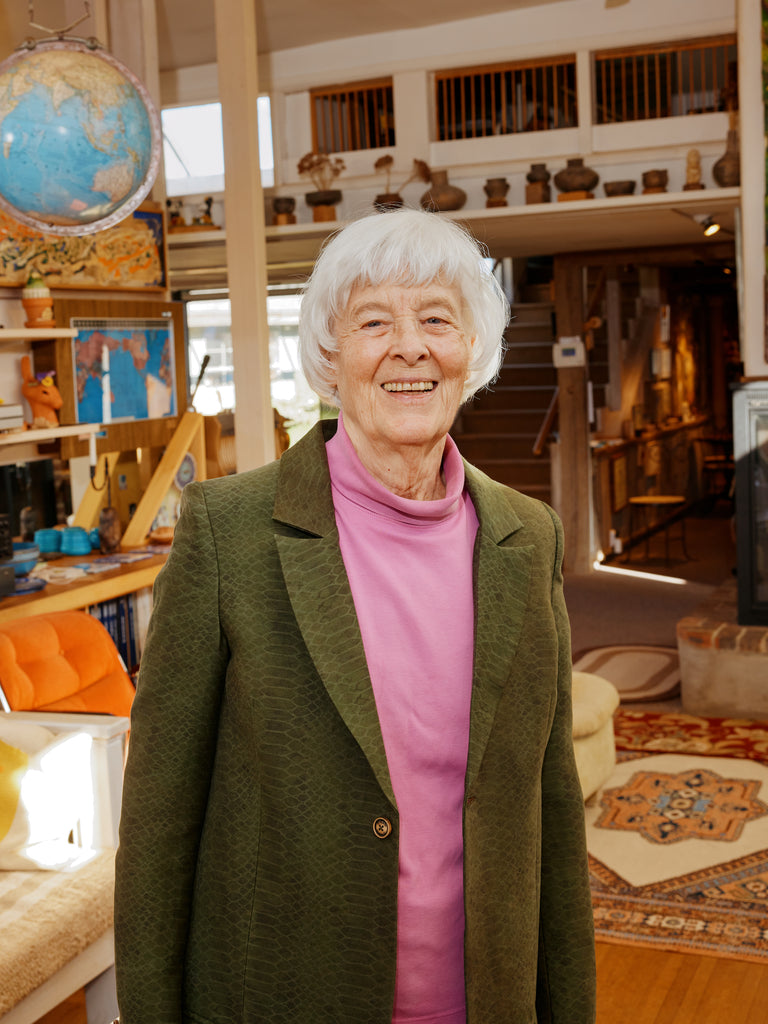
Where are you from?
I hate to admit it but I grew up in Greenwich, Connecticut. I hated it. It's a fancy suburb of New York and I didn't fit in at all because I was an early hippie. But I got into my own thing when I went away to school when I was 14. I've lived in a lot of different places when Bill [Sally’s first husband] and I got married, and we moved around a lot because he was trying to find jobs. The way artists do, right?
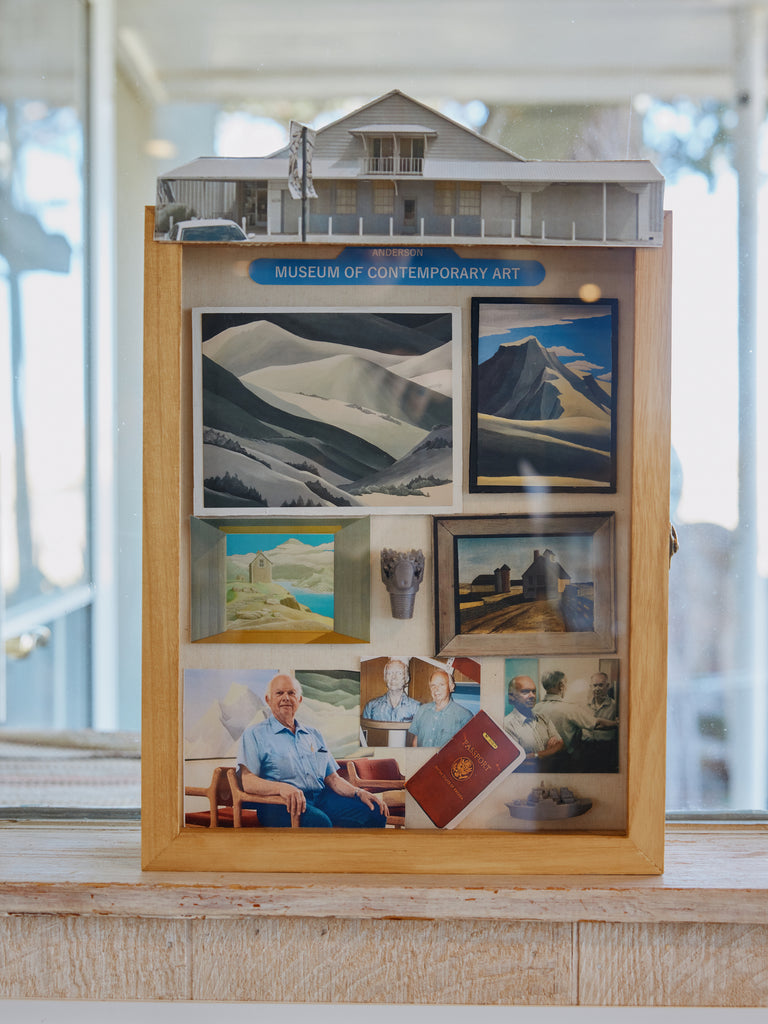
I think you're the matriarch of RAiR… you’re a mother figure to the program and you are a mother with children. So how do you feel reflecting on the program’s past, present, and future? Like what you’ve built and mothered into existence?
I first got to know the program when my first husband Bill was on it. It was a lifeline. It was an incredible lifeline. He was born in New York and was trying to have a career, but he was a figurative artist and everybody else was abstract or pop. We came here for two years. There were no other artists when we arrived. There was just us. But then the program began to develop and Bill helped it by inviting friends to come. We were friends with Milton Resnick, he’s one of the abstract expressionists. He's the least famous of them, and he fought in WWII. But he's well known now. I have one of his paintings upstairs. But anyways, he came. And Bill helped Don develop the program by suggesting people to invite and by giving just all kinds of advice and everything.
Don really appreciated that. So we had two years here at first: one year on the grant and one year Bill was painting the mural. And then we left for New York City because Bill showed a gallery some of his work.
Bill was very good, and he started showing at the best figurative artist galleries, there were very few of them at the time. But he was the best. And he had five shows in five years in New York before he was diagnosed with brain cancer. They were going to operate but there was too much of a chance that he might have become just, you know, nothing. So he didn't have the surgery, and he died when he was 40 years old.
But he said to me, ‘I've had a good run.’ And I said, ‘That's all you can say in life.’ Boy, he made the most of his short life. And Don’s first wife, Pat Anderson, had throat cancer and she died four months after Bill. Don decided to throw a retrospective show of Bill’s work in the Roswell museum. I came out for that and we reconnected. He said, ‘well come back and bring your children in the summer when they're out of school.’ So I came back, brought my children, and WHAMO! We really hit it off. And we were married the following March. It was 1980. Bill and Pat died in ‘78. So it was pretty quick for our children, but it wasn't too quick for us!
I was good friends with Pat. I thought the world of her. I thought she was wonderful. She was great. She had a sense of humor and she was smart as heck.
I’m sure that both of your partners would’ve wanted you two to be happy –
I think so. We were married 40 years when he died. It would be 43 now.
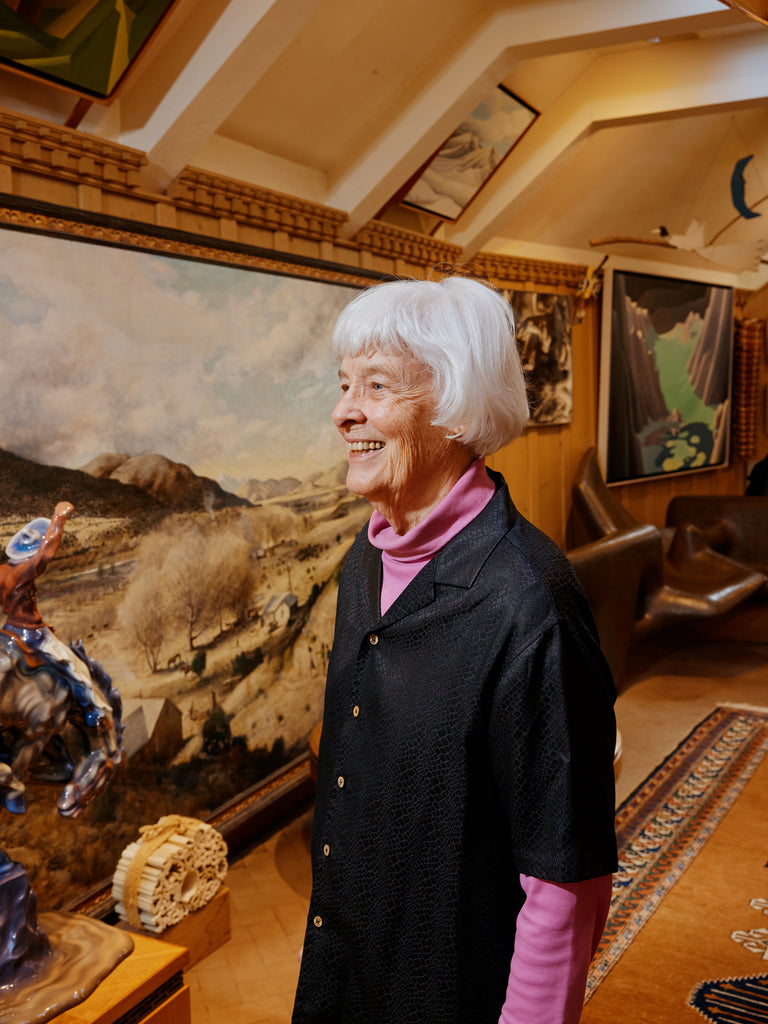
What's your favorite kind of art, what are you drawn to?
Goodness, I don't know. I like all styles. I love Milton Resnick because he turned me on to abstract expressionism. I remember Bill was mounting a show in New York of Resnik. And there was one lying on the table. And I just loved it. I love all kinds of art. People say, ‘Are you an artist?’ And I say, ‘No, but I'm a really good appreciator!’
That's so necessary. You have to have both. It seems like even if you're not an artist, you still live and see the world how an artist does.
Heavens yes. After having been married to two artists and now this program. I love artists. They're just wonderful. I'm with them 100%. Because of what they’re committed to.
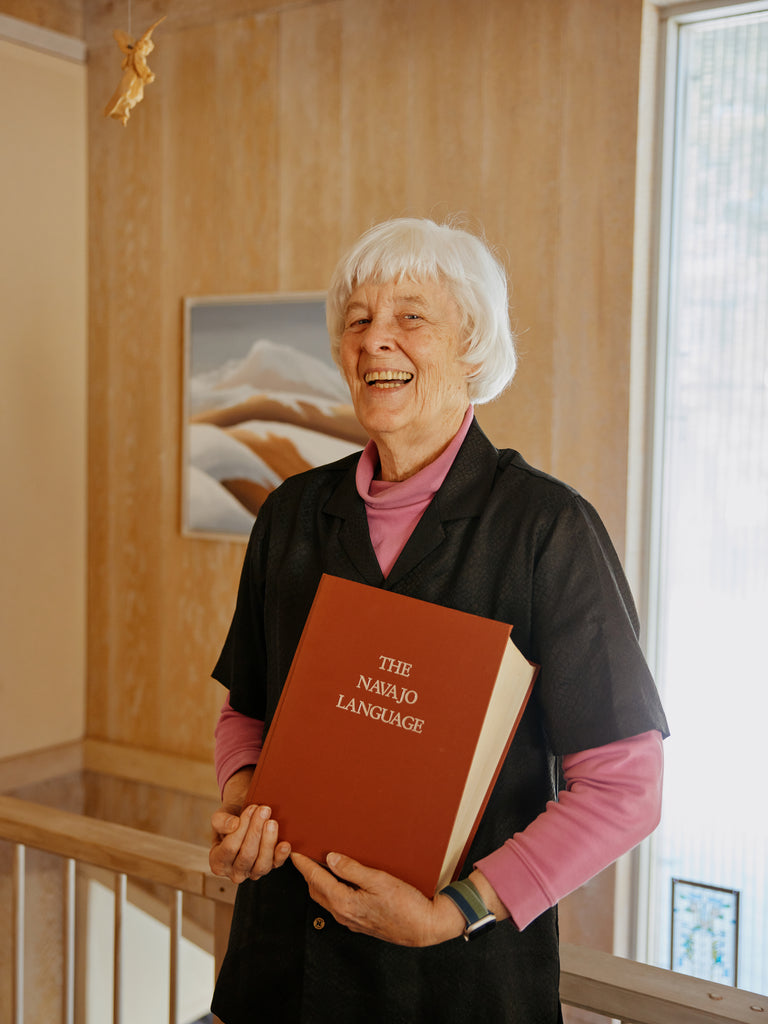
Somebody told me that you translated the first dictionary on the Navajo language.
I didn't translate it but I put it on the computer so it could be published. I can show you the book. It is very fat. What happened was I worked with Robert Young who helped write the first Navajo English dictionary. And it was really hard. And he had to invent all kinds of ways to represent Navajo because it has all kinds of sounds that aren't in English.
I received a PhD in Anthropology from the University of New Mexico and Robert Young was my mentor. He was incredible. I helped him and proposed a way to translate part of Navajo for the dictionary. Navajo has very long words, and most of them are verbs. Like the word for ‘run.’ The root of that word is ‘wod.’ Very simple, right? ‘Wod’ means to run. But in Navajo, you add a lot of prefixes. There are scores of prefixes and it’s very confusing. So I said, ‘Instead of looking up the beginning of the word (like ‘R’ for run) , let's do it by the end of the word.’ So if you look up ‘wod’, then all the words for run are there.

Wow. So you're very familiar with the Navajo language then?
I guess I am. I can't speak it, it takes years to learn to speak it. I only know of two or three English people who ever learned to speak Navajo fluently. I can speak French, Italian, and German and I'm pretty good at them. But I can't speak Navajo. I can say things in Navajo but I can't speak it.

Culture is intertwined in language and it informs the way people think too.
Yes. Exactly.
So does having all those prefixes for ‘run’ in Navajo point to anything? Like how they think about running?
It’s much more complicated than that. All the prefixes are just the grammar part. But I've loved studying Navajo because I had studied French intensively. I'd been to Italy and knew some Italian. I'd been to Germany and knew some German. I've studied a lot of different European languages. This was a whole different ballpark. I wrote my dissertation on the Navajo language. I had so much fun trying to understand what was different about the meanings of the words. it just changed my life. It was wonderful.

That's amazing. I'm Chinese and speak Mandarin. And I see that language informs the way you see and think about the world. Like ‘Coca-Cola’ in Mandarin is pronounced CO KE KUH LUH which translates to ‘happiness in mouth!’
Oh that’s beautiful, I love that. There’s all these different ways of saying things. I think it's so interesting. Like the Navajo, they have their way of seeing the world and their language reflects that. I loved it because I was bursting out of the European mode. They’re all the same outlook, you know? In Mandarin the grammar is different, isn’t it? And very simple?
Yeah. There's no ‘he’ or ‘she,’ it's just ‘it.’
That's great. Our kids would love that. We have a granddaughter who wants to be referred to as They.
How do you navigate that?
Well, we just say ‘they.’ They’re great. We’re learning and it's a little hard. It happened about a year and a half ago. So we're still learning.
I just loved breaking out of the mold, you know? I had the best time studying, I really did. I wouldn’t do it again because of the drive to UNM. I had to go three times a week at the beginning. But the whole experience was absolutely beyond comparison.

I’m a new mother and my baby is 10 months old. I’m in the midst of grappling with how different my life is now. There was before motherhood and then there’s after. I'm just wondering for you, how did you balance being a mother? And what are your thoughts now as a great-grandmother?
I just loved it and I didn't have trouble balancing because I loved it right from the beginning. I mean, it was a juggling act. But I didn't have to work because Bill, my first husband, wouldn't let me leave the baby. So we had even less money, but every now and then he would sell something and then we'd say, ‘Oh Boy!’ But I just loved being a mother. I loved being a grandmother. My children are unbelievable. And they remind me so much of their father, it makes me very happy. He died when they were 6 and 12, which was very young. That was really hard. It's just so rewarding to watch them grow and learn and change.

What's your daily routine like?
There’s not much of a routine. I love to read. I used to watch the news but I can’t do that anymore. It doesn’t help. I take it day by day.
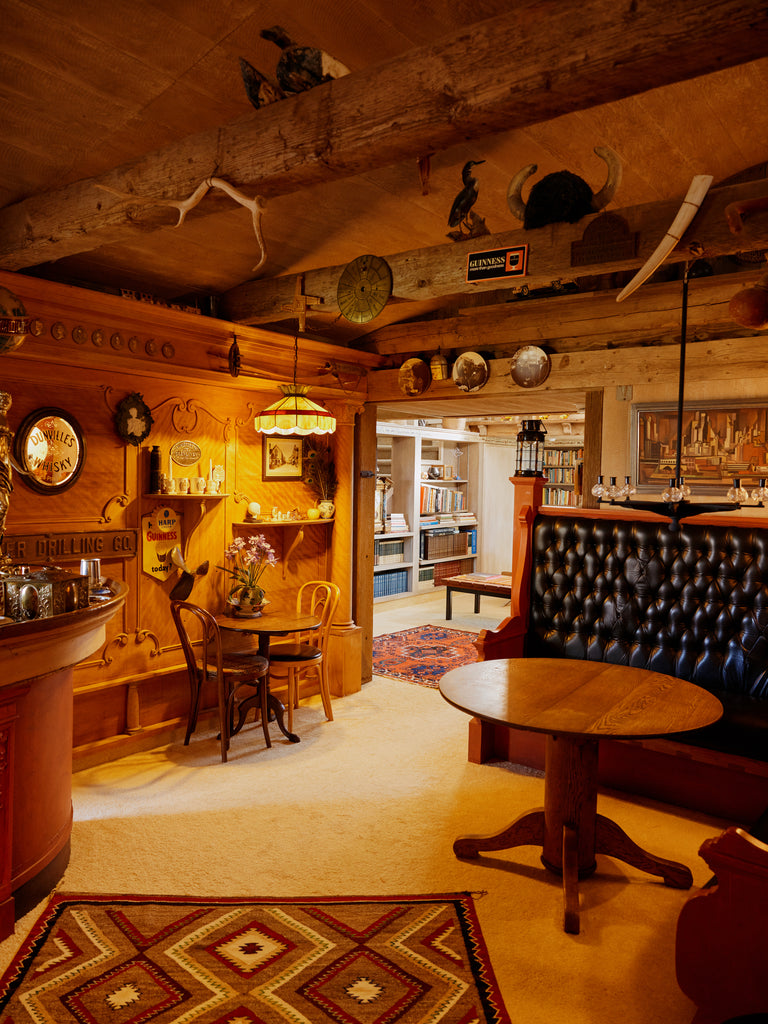
So Ziran comes from Daoism and it means, ‘natural, spontaneous, and free.’ To push away outside influence and embrace your authenticity. Do you feel like you live the Ziran way?
Well I've been extraordinarily blessed having two husbands that I just adored. I was immersed in both of their lives and different ways. And now I’m trying to get back to some semblance of finding out who I am again.

I feel like you will find your way. It seems like throughout your whole life, you've always found your way. Give yourself grace.
Yes, I have. Thank you.

I think it's very interesting you saying you're going to find out who you are. Because we think that with time and age you automatically know who you are. But it's truly a lifelong journey of work.
Absolutely. You always need to work on that. I think of myself as having been different people in a way. The wife of a starving artist with huge ambition. I loved his ambition, and I loved him and his work. I was just dedicated and then I did stuff on my own too. But then with Don it was a different me, because Don and Bill were very unlike each other.
I'd like to do something significant and helpful. When I was working with kids and teens it was glorious. I was helping young, mostly Hispanic kids get out of the morass that’s in Roswell. There's nothing much to do here. Fortunately one of the artists-in-residence who had finished his grant, came over, and started teaching art at the Teen Center. That was fantastic.

So that's you helping. Even now you’re spreading your tentacles and maybe you don't see how much you're helping people on the day to day, but you truly are.
I’d like to do more.
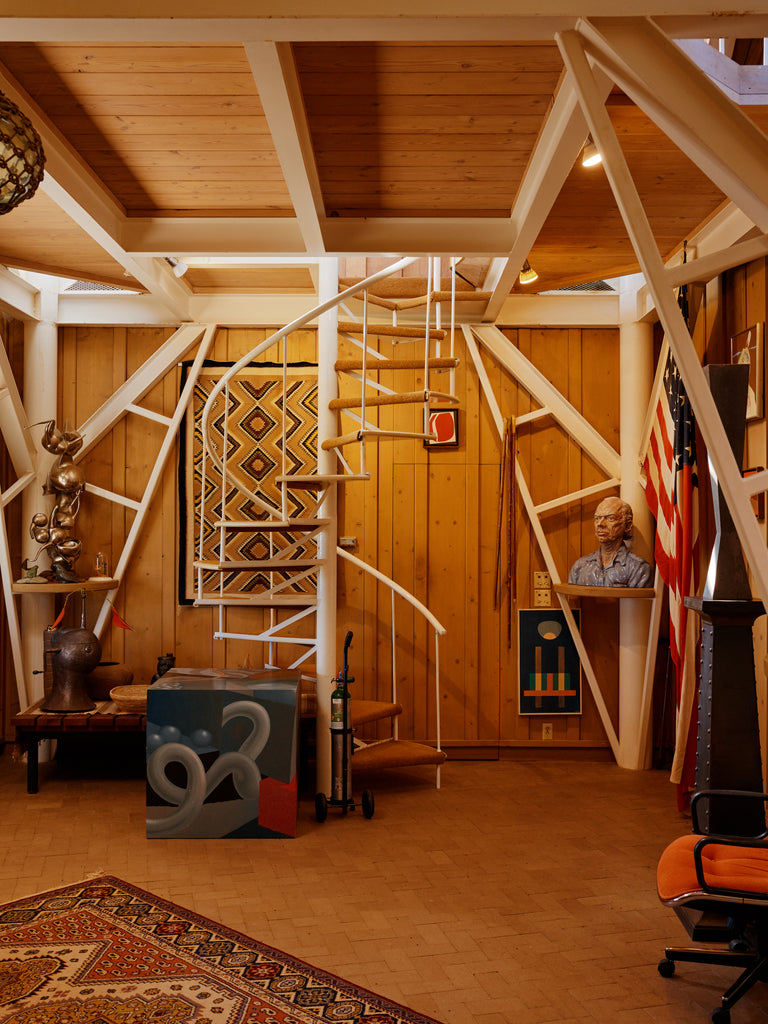
Thank you so much Sally. I’m honored you gave us the time to talk and welcome us into your space.
It's an amazing house, isn't it?
And you are amazing too, Sally. It's not just the house or Don, it's you too. You have an incredible spirit and energy.
Well, thank you. Thank you very much.
Can you show us the Navajo dictionary?
I'd love to. My pride and joy here.



Words: Kelly Wang Shanahan (@theziran)
Photography: Brad Trone (@bradtrone)
Muse: Sally Anderson
Roswell, New Mexico. April 2023.
